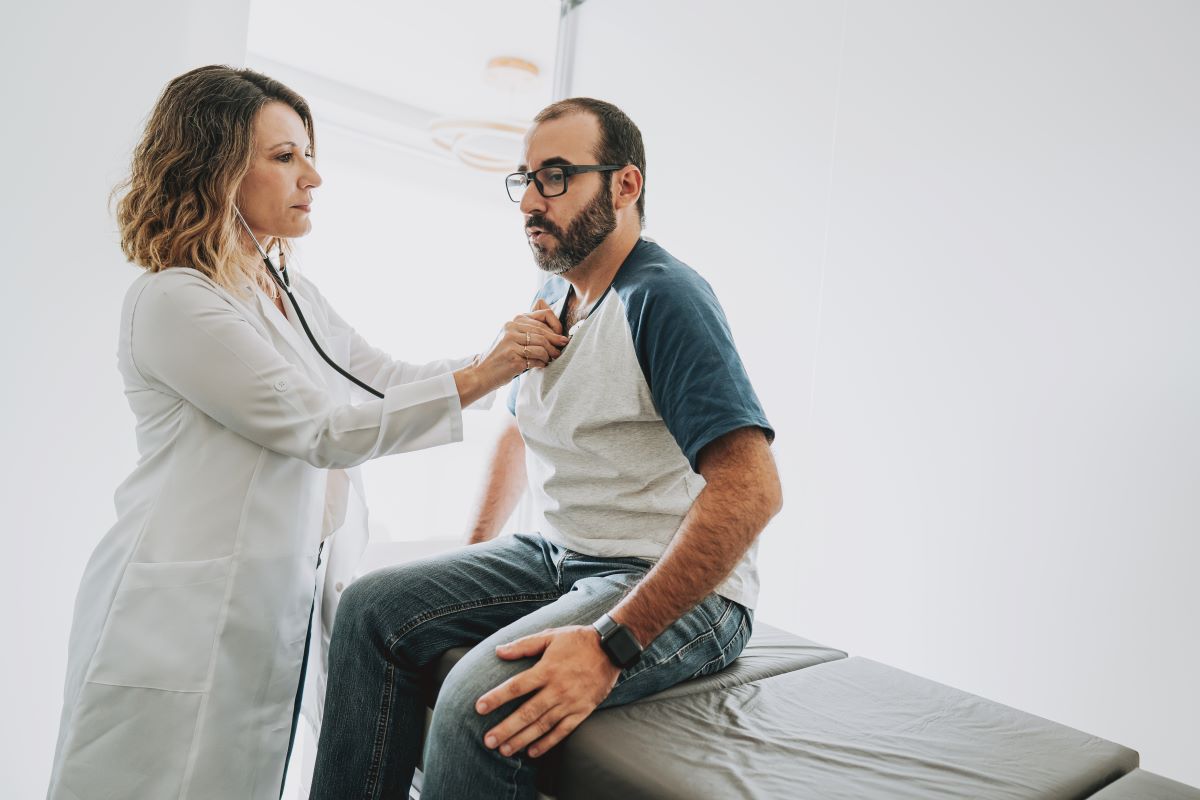
Cardiovascular disease remains the leading cause of death among men in the United States, cutting across all racial and ethnic groups. Every 33 seconds, a life is lost to this largely preventable condition. In 2022 alone, heart disease accounted for more than 700,000 deaths — nearly one in every five nationwide.
The risk factor pile-up
Why are men particularly vulnerable? It’s the intersection of biology and behavior. High blood pressure, elevated cholesterol, diabetes, smoking and obesity are the most common drivers and they’re on the rise. The American Heart Association projects that by 2050, 61% of U.S. adults will have hypertension, with obesity and diabetes following similar trajectories. These trends signal an urgent need for proactive intervention.
But the outlook isn’t all bleak. Medications can be helpful and work best when combined with key lifestyle modifications. Here’s your heart health game plan.
1. Cholesterol management
Statins such as atorvastatin and rosuvastatin remain the first-line treatment for lowering LDL cholesterol and reducing the risk of heart disease. A 2010 Lancet meta-analysis showed that a 39 mg/dL drop in LDL cut major cardiovascular events by 22% and all-cause mortality by 10%.
For those requiring additional LDL reduction or who cannot tolerate statins, options include ezetimibe (which lowers LDL by 15–20%), bempedoic acid (Nexletol) for statin-intolerant patients and injectable therapies such as PCSK9 inhibitors or inclisiran, which can reduce LDL by 50–60% in high-risk patients.
Bottom line: Start with statins and consider add-ons or alternatives when needed to hit your LDL goals.
2. Blood pressure medications: Small drops, big gains
ACE inhibitors (like lisinopril), ARBs (like losartan), calcium channel blockers and thiazide diuretics form the core of blood pressure treatment. A 2021 BMJ study found that lowering systolic blood pressure by just five mmHg reduced the risk of stroke by 13% and heart disease by 7%.
Sodium reduction also helps. While the AHA recommends less than 2,300 mg/day (ideally 1,500 mg), most Americans consume 3,400–3,700 mg. Cutting sodium can lower systolic pressure by 5–6 mmHg.
Bottom line: If one drug isn’t enough, a low-dose combo plus sodium reduction can boost results with fewer side effects.
3. Lifestyle: The original medicine
Medications alone cannot offset the impact of unhealthy lifestyle choices. In the landmark PREDIMED trial, a Mediterranean diet of nuts, fish, whole grains and leafy greens supplemented with extra-virgin olive oil reduced major cardiovascular events by approximately 30 percent. When combined with physical activity, the benefits multiply. A 2023 JAMA meta-analysis found that just two sessions of resistance training per week lowered systolic blood pressure by up to 9 mm Hg. Adding 150 minutes of moderate-intensity aerobic exercise each week enhances medication effectiveness and provides independent protection for the vascular system.
Sleep and stress are equally critical. Chronic sleep deprivation and unmanaged stress accelerate vascular aging and contribute to hypertension. Aim for 7–8 hours of restorative sleep each night and incorporate regular stress-reduction practices such as mindfulness, meditation, calming music or a brisk walk to help reset your nervous system and support overall cardiovascular health.
Bottom line: Let medications do their job but give them a fighting chance by fueling your body with a Mediterranean plate, strength training twice a week, keeping your heart rate up for 150 minutes and protecting your downtime as fiercely as you preserve your workout.
4. Supplements: Not magic bullets
Many patients take supplements for heart protection, but most over-the-counter products fail to live up to the hype. Some, like prescription-strength omega-3s (e.g., icosapent ethyl), have proven benefits for high-risk patients, unlike standard fish oil, which lacks consistent evidence.
Fiber supplements like psyllium can modestly lower LDL, and CoQ10 may ease statin-related muscle symptoms, but multivitamins, vitamin D and antioxidants haven’t shown clear cardiovascular benefits in major trials.
The bottom line is that some supplements may help but they’re no replacement for medication, healthy eating and regular exercise.
The final word
Cardiovascular disease may be the heavyweight champ of men’s health threats — but it’s also beatable. Statins reduce plaque, blood pressure meds ease arterial strain and SGLT2 inhibitors protect your heart’s pump. Pair them with a Mediterranean-style diet, regular exercise, improved sleep and reduced stress for maximum protection.
Get your numbers checked. Ask your doctor about the medications and lifestyle tools that best match your profile. Your future self will thank you.
Learn more about Northside Hospital Heart Institute.

